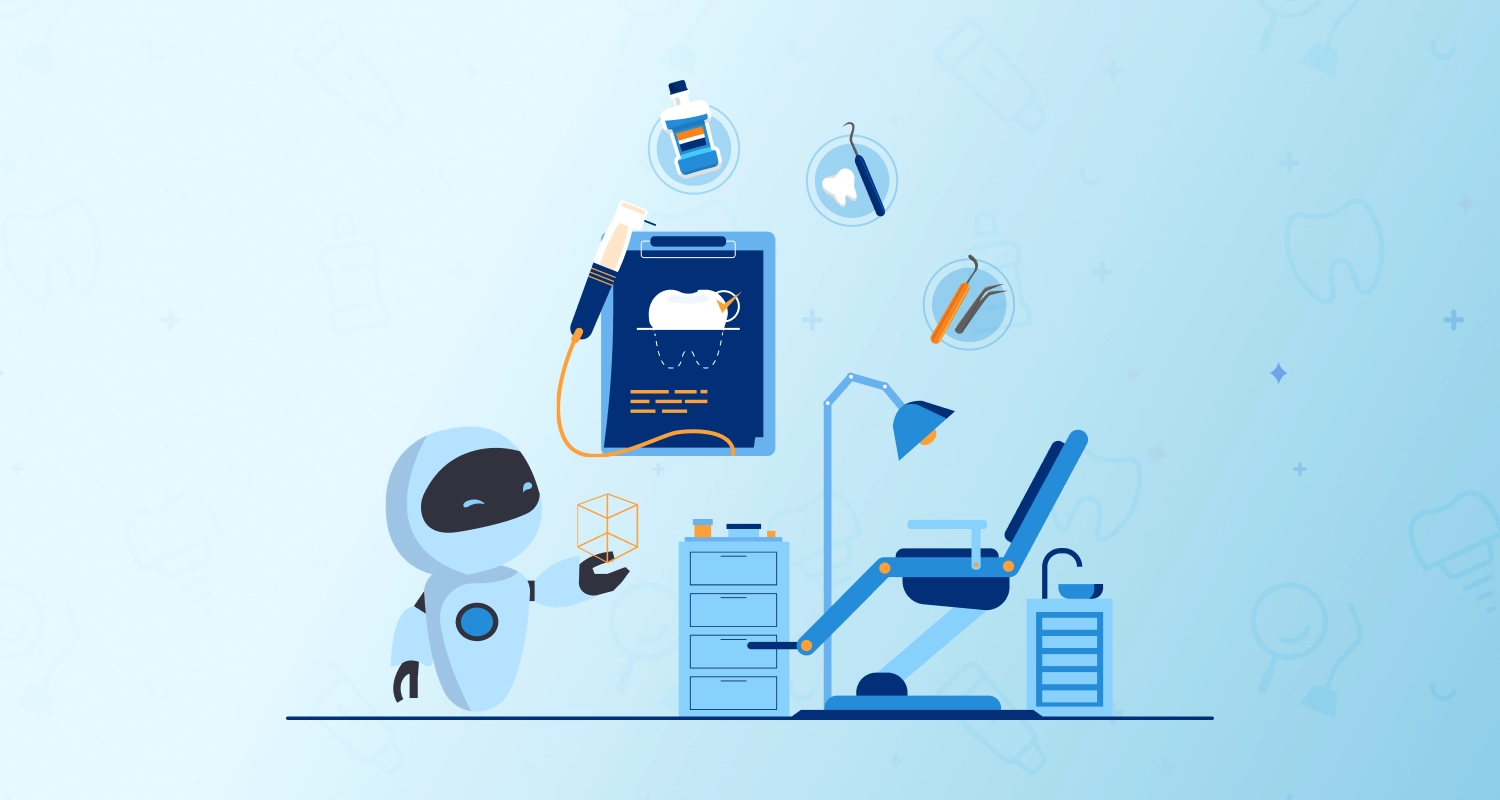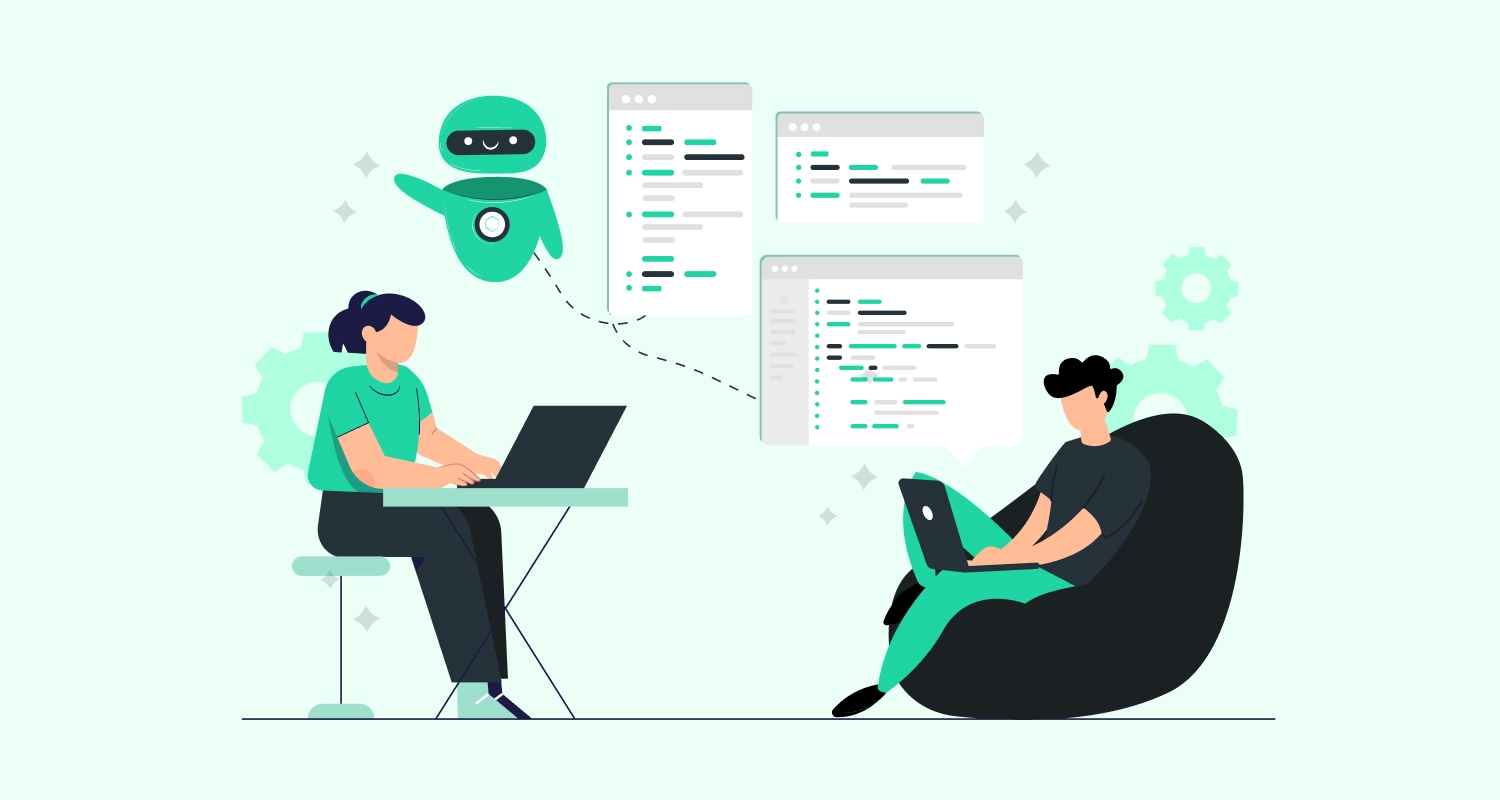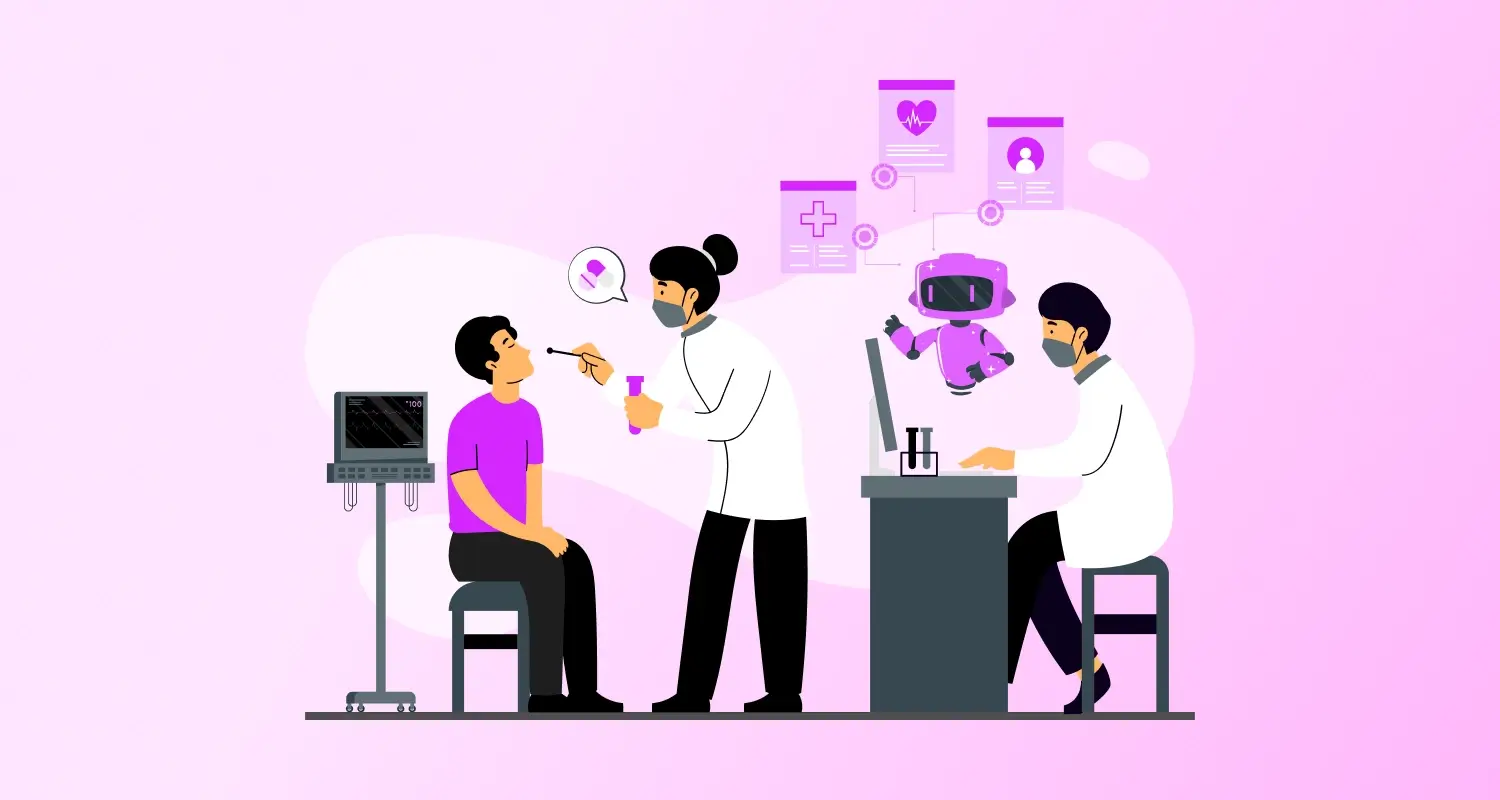The rapid adoption of Artificial Intelligence in the pharmaceutical industry is driving huge transformation, making a significant impact on various industries, pharmaceuticals included. With AI tools in custom healthcare software development, drug discovery can change how pharma companies research, develop and bring solutions to the market. AI is capable of transforming multiple things with the use of Ml and data.
As per a report from GM insights, the growth rate of AI in pharma is expected at 29.6% CAGR in the next five years. Top business ideas formed are inclusive of Artificial Intelligence today and are paving the way to innovations. By witnessing this exciting growth, let’s explore the use cases of AI in pharmaceutical industry and how Artificial Intelligence healthcare startups can speedily research and grow.
What are the Key Benefits of AI Applications in Pharmaceuticals?
AI has a huge effect on the pharmaceutical industry today. With a growing number of healthcare and pharma companies, the incorporation of AI techniques into operations is revolutionary resulting increase in creativity and improved efficiency.
As we all know AI has great potential to influence several pharmaceutical processes like drug discovery, clinical trials, etc., let’s examine the benefits of AI in pharmacy with the most common use cases in the industry.
Drug Development and Discovery with Next-Gen AI
Drug development and discovery is one such field where AI influence is more and is an expensive process with new medications that take years of financial outlay. By accelerating the process of possible outcomes AI has completely changed with the use of ML Algorithms, better research, and precise identification of teams that analyze large volumes of chemical, biological, and clinical data.
AI algorithms can assist in determining which compounds have the potential by predicting the chemicals that interact with biological targets. AI is also essential to forecast the efficacy of drugs. AI models can predict the side effects of the medication before it is put to clinical testing. AI analyzes the data in prior and helps in clinical trials. Hire dedicated developers who are capable of using the predictive ability to lower the chance of failure in later phases and speed up the pharmaceutical app development process.
Clinical Trials of AI
Clinical trials are very time-consuming and expensive too. However, they are essential to releasing novel medications. Clinical trials are more effective with AI as by analyzing and evaluating the data, patient demographics, and genetic information, AI-powered systems can assist in the design of clinical trials. This helps researchers to create better experiments. By employing predictive analytics more precisely for qualified applicants, AI also transforms the patient recruiting process. AI systems offer real-time monitoring throughout the trial process with prompt identification of negative effects and actions.
Customized Healthcare Plan and Treatment
A generalist approach to patient care is occasionally used in conventional therapy processes, which might not be advantageous for some individuals. Artificial intelligence in pharmaceutical industry helps to evaluate patient data and information to understand and provide customized treatment plans.
Depending on a patient’s particular genetic composition, lifestyle, and medical background, you can anticipate and plan customized treatment and health regimes. This method guarantees that therapies are less likely to result in negative side effects and are more effective.
Furthermore, sophisticated AI systems can examine complex genomic data to find mutations or biomarkers linked to certain diseases. This genomic knowledge enables precision medicine, which focuses on the underlying genetic features of a patient’s condition to offer more efficient and customized treatment alternatives.
Predictive Analytics to AI in Pharmaceuticals
Predictive AI in pharmaceutical industry is one of the key benefits is using AI in pharmaceutical industry. Predicting the possible results quickly and evaluating volumes of medication for quick data from clinical trials, and patient records, AI helps in enhancing the pharmaceutical sector. Pharmaceutical firms can lower risks, give priority to the most promising medication prospects, and make better judgments as a result.
This method not only enhances medicine development but also has a big impact on how pharmaceutical companies sell their products. Businesses can better plan their production and distribution by forecasting market demand, which helps them prevent waste and shortages. Furthermore, predictive analytics in pharmaceuticals enables companies to determine which items are most likely to yield the biggest returns, guaranteeing more successful and efficient marketing and sales initiatives.
AI in the Repurposing of Drugs
Drug repurposing is nothing but a process to find new users for medical purposes approved to test in different conditions. With the past data and trials or results, researchers can identify the potential of the drugs. This method allowed the companies to bring in new medications and therapies to market quickly at reasonable costs reducing the procedure to develop a new drug.
AI has proven particularly helpful in this area. For example, during the pandemic, AI was used to analyze the drug database that could be effective in killing the virus. Instead of experimenting from scratch, AI helps companies to act on potential treatments faster with less process and make them ready for patients. This helps in reducing costs, and time and gives a promising therapy to patients.

Pharmacovigilance with AI in Pharmacy
AI is significantly influencing pharmacovigilance or the monitoring of drug safety. AI enables pharmaceutical companies to react to safety concerns more rapidly by evaluating vast amounts of real-time data from clinical studies and patient records. Healthcare providers and regulatory agencies can spot possible problems before they become major ones by using AI-driven technologies to automate the identification and reporting of adverse medication reactions. This increases the effectiveness of pharmacovigilance initiatives while also improving patient safety.
AI is making safety data more immediate and actionable by cutting down on the time and effort required to monitor pharmaceutical safety, which eventually benefits patients and the healthcare system overall.
Optimization of the Supply Chain Management
The supply chain management of pharma companies is becoming robust and efficient with AI. Artificial Intelligence assists companies in forecasting demand using predictive analytics that helps to improve inventory control and schedule manufacturing optimization. This lowers the possibility of stockouts or overproduction and keeps the medication available timely.
AI is also essential to distribution and logistics because it can spot any bottlenecks before they happen. Based on real-time data, AI can recommend alternate routes or suppliers in the event of disruptions, reducing delays. In the end, this improves patient care and lowers expenses for pharmaceutical businesses by guaranteeing that medicine distribution stays efficient and on schedule.
Significant Challenges Faced by Pharmaceutical Companies Using AI
AI in pharmaceutical industry has the potential to solve the challenges that affect the efficacy and scalability of AI solutions to the use case we read in the above section.
Data Security and Privacy Issues
Data security and privacy are the most important and key issues when it comes to handling large volumes of sensitive data of clinical records, patient records, trials, and research. With AI privacy protection of such data is effectively managed. The usage of AI brings concerns about data processing security, sharing, and storage, and any violation leads to regulatory fines, legal issues, and a company’s reputation.
Handling of personal data is governed by stringent legislation in many nations, such as the GDPR in Europe. Making sure AI systems abide by these rules complicates the implementation procedure. The full promise of AI in pharmaceutical innovation might not be achieved in the absence of robust data security measures.
Regulatory Difficulties and Adherence
Another challenge with deploying AI in the pharmaceutical industry or company is the regulatory environment. With strict guidelines established by the organizations like FDA, companies should follow along with AI implementation for drug and clinical research. These rules guarantee data integrity, patient safety, and the moral use of AI. However, the complexity of AI-driven technologies may not be sufficiently covered by the current regulatory frameworks, which were largely created for conventional medication development procedures.
Businesses face uncertainty as a result of the absence of clear criteria for AI uses in medicines. As pharmaceutical businesses work through regulatory obstacles, awaiting approvals or clarification on compliance difficulties, this can impede innovation. Regulations will need to be updated and improved as AI develops to take these new technologies into account.
Connectivity with Current Systems
Integrating AI into current processes and systems is a major issue for pharma companies. Many organizations are using technologies and the latest trends that are not compatible with AI. However, these legacy systems frequently lack adaptability, processing power, and storage space.
A steep learning curve or even resistance to change may result from employees’ unfamiliarity with AI-based technologies. Businesses must make significant investments in training programs and continuous assistance to help employees get used to new tools and methods of working if they want AI adoption to be successful. The main obstacle is making sure AI can be seamlessly incorporated into existing systems without interfering with regular company processes.
Conclusion
Leading AI software development company, CMARIX is committed to assisting companies in the pharmaceutical sector in utilizing artificial intelligence. We create customized solutions that improve clinical trials, expedite drug discovery, and simplify operational procedures thanks to our extensive knowledge of AI.
Pharmaceutical firms may improve decision-making and achieve better results by using our sophisticated analytics solutions to extract important insights from complicated datasets. We also concentrate on AI-powered automation to boost output and cut expenses, guaranteeing the seamless and effective functioning of your business. Furthermore, CMARIX places a high priority on security and compliance, making sure that the solution for AI pharmaceutical company adhere to legal specifications and protects private pharmaceutical information.
Frequently Asked Questions
What is the future of AI in pharmaceutical industry?
Clinical trials, customized medication, and drug development become quick, effective, and affordable with AI. It will facilitate drug repurposing, optimize supply chains, and improve drug safety monitoring. All things considered, AI will lower expenses and enhance patient outcomes.
How can AI help in predicting future health trends in pharma industry?
AI is used to interact with various chemicals and predict the possible or potential compounds with the greatest therapeutic effect. Also, AI is essential to forecast the toxicity of the drugs and study the past data to give better medication.
Can AI help in the environmental impact of pharma production?
Yes, AI helps reduce the environmental impact of pharma production. By optimizing processes to reduce waste, improve resource efficiency, and streamline workflows. AI supports more sustainable practices.
What is the importance of AI in the pharmaceutical sector?
The importance of AI in the pharma industry helps in optimizing clinical trends, and medication, reduces time in data research, and provides quick results. With safety and security aligned, AI aids researchers in analyzing medical compounds to increase efficacy and reduce adverse effects.







